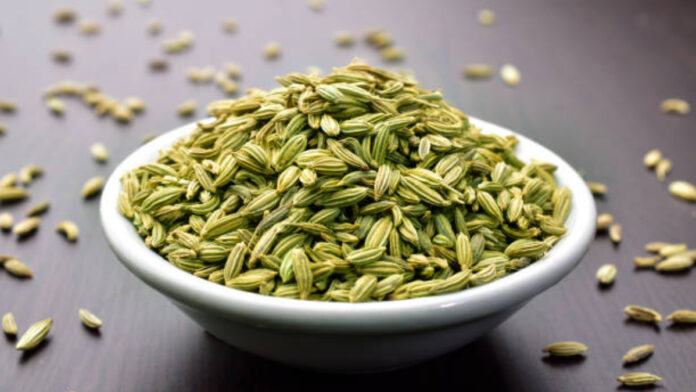Introduction

Fennel seeds, also known as Saunf in Hindi, are small, aromatic seeds that are commonly used in various culinary dishes, as well as for their medicinal properties. These seeds are native to the Mediterranean region and are widely used in Indian, Middle Eastern, and European cuisines. They belong to the Apiaceae family, which includes other plants like carrots and celery. Fennel seeds are not only a delicious addition to foods but are also packed with a variety of health benefits, making them a valuable addition to both traditional and modern wellness practices.
Forms of Fennel Seeds
Fennel seeds are available in several forms, catering to different culinary and therapeutic needs:
- Whole Fennel Seeds: The most common form, whole fennel seeds, can be used in both raw and roasted forms. They have a slightly sweet, licorice-like taste and can be added to soups, curries, teas, or used as a garnish.
- Ground Fennel Powder: Ground fennel powder is made by grinding the whole fennel seeds into a fine powder. This form is often used in spice blends, marinades, and as a flavoring agent in various dishes.
- Fennel Oil: Fennel essential oil is derived from fennel seeds through steam distillation. It has a strong, sweet aroma and is widely used in aromatherapy and as a flavoring agent in foods and beverages.
- Fennel Tea: Fennel seeds are commonly steeped in hot water to make fennel tea. This soothing beverage is consumed for its digestive and health benefits.
- Fennel Seed Extracts: Extracts of fennel seeds are available in liquid or capsule form. These extracts are concentrated versions of fennel’s active ingredients, commonly used in supplements for specific health purposes.
Health Benefits of Fennel Seeds
Fennel seeds have been used in traditional medicine for centuries, especially in Ayurveda and Chinese medicine. Here are some of the key health benefits:

- Improved Digestion: Fennel seeds are well-known for their digestive benefits. They help relieve indigestion, bloating, and gas, and are often consumed after meals to ease digestion. The seeds contain essential oils and fiber that stimulate the production of digestive enzymes, promoting better nutrient absorption.
- Antioxidant Properties: Fennel seeds are rich in antioxidants, such as flavonoids, which help fight free radicals in the body. This can reduce oxidative stress and lower the risk of chronic diseases like heart disease and cancer.
- Hormonal Balance: Fennel seeds are known for their phytoestrogenic properties, which mimic the effects of estrogen in the body. This makes them beneficial for regulating hormonal balance, especially in women. Fennel seeds may help alleviate symptoms of PMS, menopause, and support breast health.
- Weight Management: Fennel seeds are often included in weight loss regimens due to their ability to promote satiety and reduce appetite. They act as a natural diuretic, which can help in eliminating excess water weight.
- Anti-inflammatory Effects: Fennel seeds have anti-inflammatory properties, which can be helpful in reducing symptoms of inflammation-related conditions such as arthritis and asthma. Their high content of anethole, a compound with anti-inflammatory properties, aids in the relief of these conditions.
- Improved Respiratory Health: Fennel seeds may also benefit the respiratory system by promoting easier breathing and reducing symptoms of cough, bronchitis, and other respiratory issues. They have been used in herbal teas to clear mucus from the airways.
- Rich in Nutrients: Fennel seeds are a good source of vitamins and minerals, including Vitamin C, calcium, iron, magnesium, and potassium. These nutrients support overall health and help maintain bone strength, cardiovascular health, and a healthy immune system.
- Detoxification: Fennel seeds help detoxify the body by promoting liver function and assisting in the elimination of toxins. They support the removal of waste products through increased urination and sweating.
Potential Side Effects of Fennel Seeds
While fennel seeds are generally considered safe when consumed in moderation, they can cause side effects in some individuals. It is important to be aware of the following potential risks:

- Allergic Reactions: Some people may be allergic to fennel seeds. Symptoms of an allergic reaction may include itching, rash, swelling, or difficulty breathing. In such cases, fennel should be avoided.
- Hormonal Effects: Due to their phytoestrogenic properties, fennel seeds may have a hormonal effect, which may not be suitable for individuals with hormone-sensitive conditions such as breast cancer, ovarian cancer, or uterine fibroids. It’s important to consult with a healthcare provider before consuming fennel seeds regularly in such cases.
- Overconsumption: Excessive consumption of fennel seeds may lead to adverse effects like digestive upset, diarrhea, or nausea. It’s best to consume them in moderation (usually around 1–2 teaspoons per day).
- Interaction with Medications: Fennel seeds can interact with certain medications, particularly those related to blood pressure, blood thinning, and hormone therapy. If you are on any prescription medication, consult your healthcare provider before adding fennel seeds to your routine.
- Pregnancy: While fennel seeds are generally safe for most people, pregnant women should exercise caution. The seeds may have mild uterine-stimulating effects, so they are best avoided or consumed in small amounts during pregnancy, unless approved by a healthcare provider.
- Infant Health: While fennel is sometimes used to relieve colic in babies, excessive consumption can lead to complications, as it may affect the baby’s hormone levels. It is important to consult a pediatrician before using fennel for infants.
This Article is for Basic Information. Contact a professional doctor before using it.
HAKEEM KARAMAT ULLAH
+923090560000




